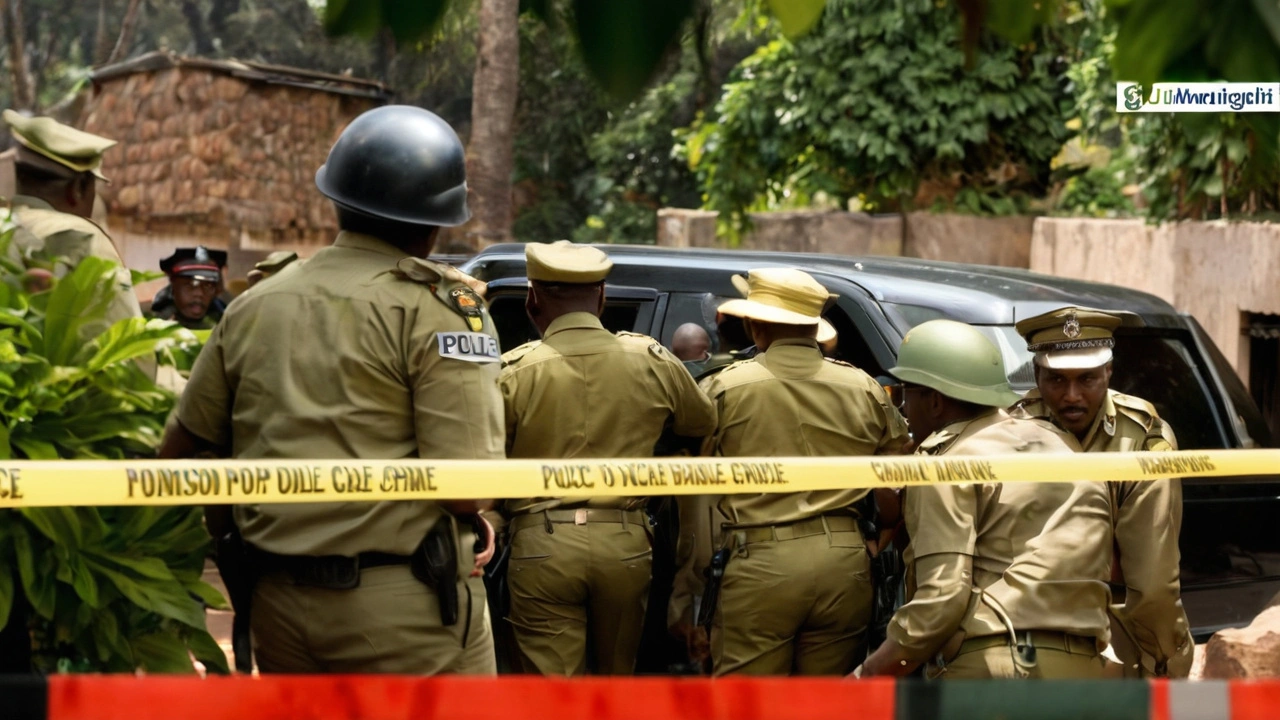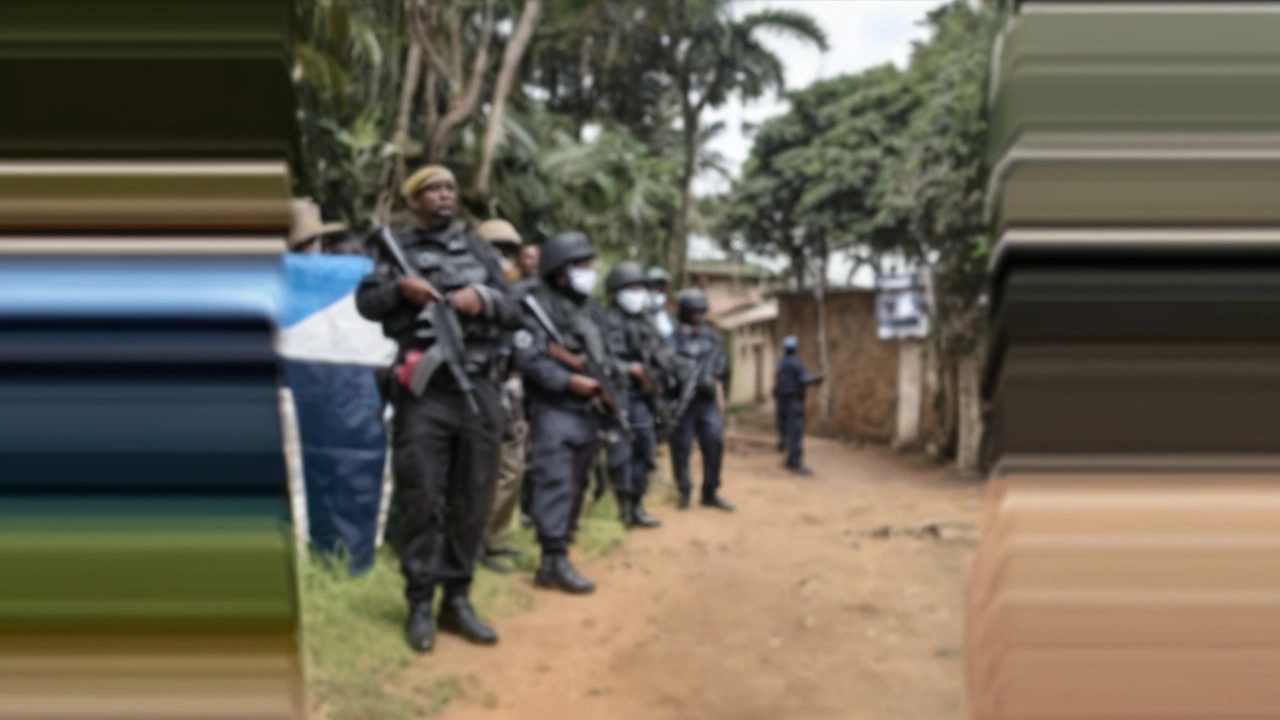Tense Standoff as Heavily Armed Police Encircle Jimi Wanjigi's Nairobi Residence
Nairobi found itself embroiled in yet another episode of intense drama as heavily armed police officers laid siege to the home of prominent businessman and political figure Jimi Wanjigi. This latest development has not only kept residents of Nairobi on edge but has also drawn significant national and international attention. The drama began when reports surfaced that police, allegedly searching for Wanjigi following the discovery of an arsenal of weapons including five rifles and 93 bullets, surrounded his residence.
Wanjigi, a well-known figure in Kenyan politics and business, has frequently found himself in the crosshairs of authorities. This most recent episode started when police attempted to arrest him at his Kwacha Group offices in Westlands, Nairobi. That attempt, which turned into an 18-hour standoff, was rife with tension and underscored the deep divisions between Wanjigi and law enforcement agencies.
The Dramatic Arrest
The arrest of Jimi Wanjigi was an elaborate affair involving officers from various police units, including the Anti-Terrorism Police Unit. Eyewitnesses described scenes reminiscent of a high-stakes action movie, with officers escorting a Subaru vehicle believed to be transporting Wanjigi after his eventual capture. The scene was chaotic, marked by the presence of numerous heavily armed officers, police vehicles, and an anxious public.
For many Kenyans, this was not just a straightforward police operation. Wanjigi's arrest signaled an escalation in the long-standing friction between him and the authorities. Wanjigi, who leads the SAFINA party, has been vocal in his criticism of the government's handling of various issues, notably Kenya's public debt and the mismanagement of public funds. These outspoken stances have often put him at odds with those in power, raising questions about the true motivations behind the police actions.
Public Reaction and Speculations
The public reaction to the siege and subsequent arrest has been varied, with some people condemning the police action while others see it as a necessary measure to uphold law and order. Social media platforms have been abuzz with opinions, many expressing skepticism about whether the arrest was politically motivated. Various political analysts have weighed in, suggesting that Wanjigi’s arrest cannot be divorced from the broader context of Kenyan politics and the ruling party's tactics against dissenting voices.
The unfolding situation has also drawn condemnation from various civil rights organizations and political entities, which argue that such heavy-handed tactics undermine democratic principles. The legality and justification for the police operation have been questioned, especially since the initial warrant and charges leveled against Wanjigi appear complicated by diverse legal precedents and ongoing political spats.
Legal and Political Implications
Wanjigi's ongoing legal battles and his confrontations with the police have far-reaching political ramifications. As a leader of the SAFINA party, his influence extends into various spheres of Kenyan politics. His arrest and the manner in which it was carried out have raised significant concerns about the rule of law and the possible misuse of police powers for political vendettas.
Political analysts argue that such actions could have a chilling effect on political discourse in Kenya, deterring other political figures from speaking out against government policies for fear of similar reprisals. The case also highlights the need for a more transparent and accountable policing system that is not swayed by political influences.

Concluding Thoughts
As the dust settles on Jimi Wanjigi’s dramatically orchestrated arrest, the Kenyan public remains divided. Each new development is meticulously followed, underscoring the high stakes and intense emotions involved. The narrative of businessman turned political dissenter, coping with a police force under significant political influence, is one that resonates deeply within Kenyan society.
Wanjigi's legal team is expected to challenge the charges aggressively, and all eyes will be on the subsequent courtroom proceedings. Whether Wanjigi’s outspoken criticism of the government will be muzzled or whether he will emerge as a stronger political figure remains to be seen. This incident has already etched itself into the annals of modern Kenyan political history, highlighting both the resilience of dissent and the lengths to which power structures will go in maintaining control.







James Lawyer
The situation in Nairobi right now feels like a scene straight out of a thriller. Police units from the anti‑terror squad, the road‑traffic division, and plain‑clothes officers converged on Jimi Wanjigi’s residence late last night, surrounding the property with a perimeter that stretched several blocks. Witnesses reported the sound of armored vehicles humming as they patrolled the streets, while helicopters intermittently buzzed overhead, adding a cinematic backdrop to the standoff. According to local sources, the police claim they are acting on a warrant linked to an alleged cache of firearms discovered in a separate investigation. The cache reportedly includes five rifles and close to a hundred rounds of ammunition, which, if true, would raise serious concerns about illicit arms trafficking in the capital. Critics, however, argue that the timing of the operation coincides suspiciously with Wanjigi’s recent vocal criticism of the government’s debt policies, suggesting a possible political motive. Legal analysts point out that Kenyan law requires a clear chain of command and judicial oversight for such a large‑scale operation, and any deviation could be challenged in court. Human‑rights groups have already called for an independent inquiry, warning that the use of heavy weaponry against a civilian dwelling sets a dangerous precedent. Meanwhile, supporters of Wanjigi have taken to social media, posting videos of the police blockade and demanding transparency. The whole episode underscores the fragile balance between security enforcement and political freedom in Kenya. If the authorities proceed without due process, it could stir further unrest in an already polarized environment. On the other hand, a failure to address legitimate security concerns might embolden criminal elements. The upcoming court hearings will likely become a litmus test for the rule of law in the region. International observers are watching closely, aware that such internal conflicts can have broader implications for foreign investment and diplomatic relations. In summary, the police encirclement of Wanjigi’s home is a complex mix of legal, political, and security dimensions that will unfold over the coming weeks.
Abby Culbertson
Crazy stuff.
Awolumate Muhammed Abayomi
Wow, this whole thing is wild. It looks like the police really went all out, with a whole squad rolling up like they’re filming a blockbuster. Nobody knows for sure if the weapons were really there, but the rumor mill in Nairobi is buzzing non‑stop. Whatever the truth, the tension in the city is definitely rising.
Josh Tate
Honestly, the police response feels a bit over‑the‑top for a civilian home. In many countries, they'd just do a standard raid, not set up a full‑blown siege. The presence of anti‑terror units signals they think this is more than a regular arrest. Still, the public deserves clarity on why such force was deemed necessary. Let’s hope the courts sort this out without more drama.
John Smith
Here’s the quick rundown: Kenyan law, specifically the Firearms Act, requires a clear chain of custody for any seized weapons, and the anti‑terror police usually handle cases involving explosives, not standard rifles. So the involvement of that unit raises eyebrows. Also, Wanjigi’s SAFINA party has been critical of the current administration’s fiscal policies, which many analysts link to the timing of the raid. Bottom line, this isn’t just about guns, it’s political theater.
Alex Soete
Yo, anyone else feeling the adrenaline from this? Nairobi’s streets are buzzing like a hive, and the police line looks straight out of an action flick. Stay tuned, because this story’s only getting juicier.
Cara McKinzie
Im so sused, the police are like total over actors. This is like a movie set but real life!
Joseph Conlon
While the headlines scream “police siege,” the underlying legal framework is far more nuanced than most outsiders realize. The Kenyan Constitution guarantees the right to a fair trial, yet it also permits preventive detention under certain security clauses, a balance that has been contested for decades. Historically, similar high‑profile arrests have sparked protests that sometimes spill onto the streets, further complicating law‑enforcement efforts. Critics argue that the government may be leveraging these security provisions to silence dissent, whereas supporters claim it’s a necessary step to curb illegal arms proliferation. The media’s portrayal of the event can either inflame public sentiment or calm it, depending on the angle taken. International NGOs have called for transparent evidence of the alleged weapons cache before any legal conclusions are drawn. Ultimately, the outcome of this standoff will likely influence how future political confrontations are handled in Kenya.
Mohit Singh
What a mess. The police are either too paranoid or way too powerful. If they’re protecting citizens, why the drama? If they’re protecting interests, that’s a whole other story.
Damian Liszkiewicz
Let’s take a step back and consider the broader context. 🚩 The rule of law is foundational, but it must be applied evenly. 🤝 When any side feels singled out, trust erodes. 🌍 A transparent investigation could help rebuild confidence across the board.
Angela Arribas
In terms of syntax, the recent reports contain numerous commas that could be trimmed for clarity. Moreover, the phrasing “heavily armed police encircle” should be hyphenated correctly: “heavily‑armed police encircle.” Also, the apostrophe after “Wanjigi’s arrest” does not need to be duplicated. :)
Sienna Ficken
Oh great, another “dramatic arrest” for our daily dose of political theater. Like we haven’t seen enough of those in the past decade, right? The police must have missed their calling as movie directors for all this action‑packed choreography. Meanwhile, the public can binge‑watch the livestreams with popcorn. At least someone’s getting their entertainment fix. 🙄
Zac Death
Hey folks, just wanted to throw in some perspective here. While the police operation looks intense, remember that Kenya’s security forces have faced real threats in the past, from terrorism to organized crime. Balancing safety and civil liberties is never easy, especially in a bustling metropolis like Nairobi. That said, any use of force should be proportionate and backed by solid evidence. It’s also worth noting that political rivalries often get tangled up with security narratives, making it hard to separate fact from fiction. So, let’s keep the dialogue constructive and wait for the legal proceedings before jumping to conclusions. In the end, a fair process benefits everyone.
Lizzie Fournier
The whole episode shows how fragile democratic institutions can be when power dynamics shift. It’s a reminder that vigilance is key. People should stay informed and demand accountability.
JAN SAE
Listen up, team, - this is a chance to practice critical thinking, - to examine sources, - to ask for evidence, - and to keep our discussions civil, - because facts matter more than feelings, - and every well‑reasoned argument builds a stronger community.
Steve Dunkerley
From a policy‑analysis standpoint, the incident underscores deficiencies in the statutory enforcement mechanisms governing arms control. The procedural lapse-specifically, the lack of a pre‑arrest judicial order-could be deemed non‑compliant with the Kenyan Constitution’s due‑process clause. Hence, any subsequent legal challenge may hinge on the admissibility of the alleged weapons evidence. This scenario provides a textbook case for examining the interface between security protocols and constitutional safeguards.
Jasmine Hinds
Too much drama 🙃